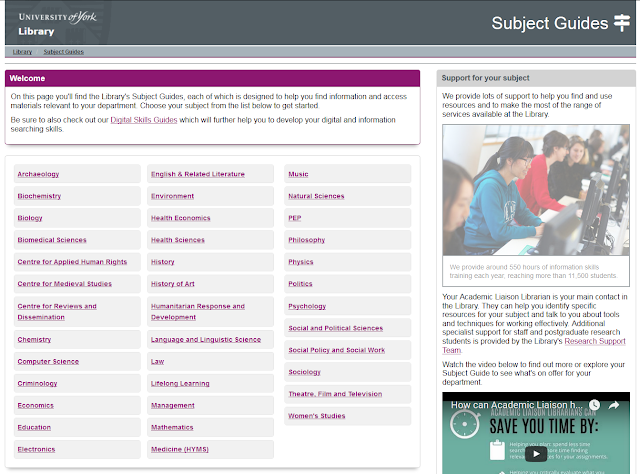What are the different library buildings for on Campus West?
We have three Library buildings all joined together - you enter through the Morrell, which contains most of the books, then turn right to go to the Burton and left for the Fairhurst. Between them they contain a variety of study spaces for different purposes (for example group work, or silent study) and a huge amount of books, journals, AV equipment, PCs and so on. Here's a video which tells you more about what goes where:
Are there any other Library sites I can use?
There are two University libraries in the heart of York which you can study in, and borrow items from: King's Manor Library, and the Minster Library. They're both in beautiful buildings. Here's the beautiful Minster Library:You can find more information including opening hours on our Locations webpage.
I want to find books and journals
Our catalogue, called YorSearch, will search our collections for you - it will tell you what we have, whether it's electronic or physically available in the Library, and where to find it. Check out this guide to YorSearch, which includes info on the book reservation system.
What about databases, where do I find them?
Databases are essential for academic work - they contain collections of high quality articles, reports, data, newspapers and more, which Google can't get to. You'll find them either via our E-resources Guide, where you can search by category or Department, or on our Subject Guides. The Library Subject Guides are curated collections of useful resources for your studies, alongside useful information on how to evaluate and organise sources.Can I book study spaces in the Library?
There are more than 1200 study spaces in the Library but it still fills up during peak times. You can book single, group or accessible study rooms online here.What else can I expect from the Library & IT?
Glad you asked. Here's a video which tells you a lot more about what we can provide.I want to talk to someone about how to use resources...
There are all sorts of ways to get help with Library services and resources. You can visit the Help Desk, which is staffed from 9am - 7pm on weekdays and 10am - 6pm at weekends. You can use the Library chat service online at any time, day or night. There's some FAQ with the chance to ask your own questions too, via LibAnswers. If you need to alert us to a problem with behaviour or building matters, you can text us on 07919 293133.
When it comes to using resources, it's worth checking out our Skills Guides. These contain useful info and interactive tutorials to improve your digital skills, and details of our training sessions. And you can always speak to your Academic Liaison Librarian, whose contact details you'll find on the Subject Guide for your Department. Here's a brief video about how Academic Liaison can help you.
So best of luck in your studies, and if you need any help from us, please just get in touch.When it comes to using resources, it's worth checking out our Skills Guides. These contain useful info and interactive tutorials to improve your digital skills, and details of our training sessions. And you can always speak to your Academic Liaison Librarian, whose contact details you'll find on the Subject Guide for your Department. Here's a brief video about how Academic Liaison can help you.
Ned Potter is part of the Academic Liaison Team





